An all-inclusive experience, redefined…At Bawah Reserve in Indonesia’s pristine Anambas...
Begin your day at Bawah Reserve with your choice from our Juice Butler service: fresh...
If you’ve noticed the beautifully patterned fabrics in your villa, you’ve already...
Ready to make a splash?For guests who are both swimming-fit and up for a challenge,...
Welcome to the thermal contrast therapy facility at Aura Sanctuary at Bawah Reserve,...
Planning your dream private island holiday in Indonesia? Here at Bawah Reserve, we...
3 ways to repost or use our Instagram Reels
We love that you want to share a little...
2024 wellness trends were exciting for sure, but it keeps getting better! The top...
A new subtle yet powerful trend - that of being “demure” and “mindful” - has been...
When we think of bees, honeybees often come to mind. However, at Bawah Reserve, a...
In the heart of Southeast Asia lies a hidden gem that promises a retreat into nature,...
It’s safe to say that if you ask someone to name a tropical island destination, they will...
As we step into 2024, the world of well-being is teeming with transformative trends that...
2 years ago for Earth Day 2022, we created 10 sincere pledges for investing in the planet...
Starting to plan your dream wedding? Some couples have a clear idea of their perfect...
We are often asked about the best time of year to schedule a trip to Bawah Reserve.Which...
Our faraway paradise is well worth the journey and there are many ways to get to Bawah,...

It's Plastic Free July a global movement that encourages millions of people around the world to be part of the solution to limit plastic pollution – for cleaner streets, oceans and to preserve the beauty of nature. Here at Bawah Reserve we have an earth focused philosophy and our environment-first sustainable approach extends across everything we do.
Operating in close alignment with Bawah Reserve is the Anambas Foundation (AF), created in 2018 as an independent, non-profit organisation. One of the primary projects for AF is their solid waste management community outreach programme.
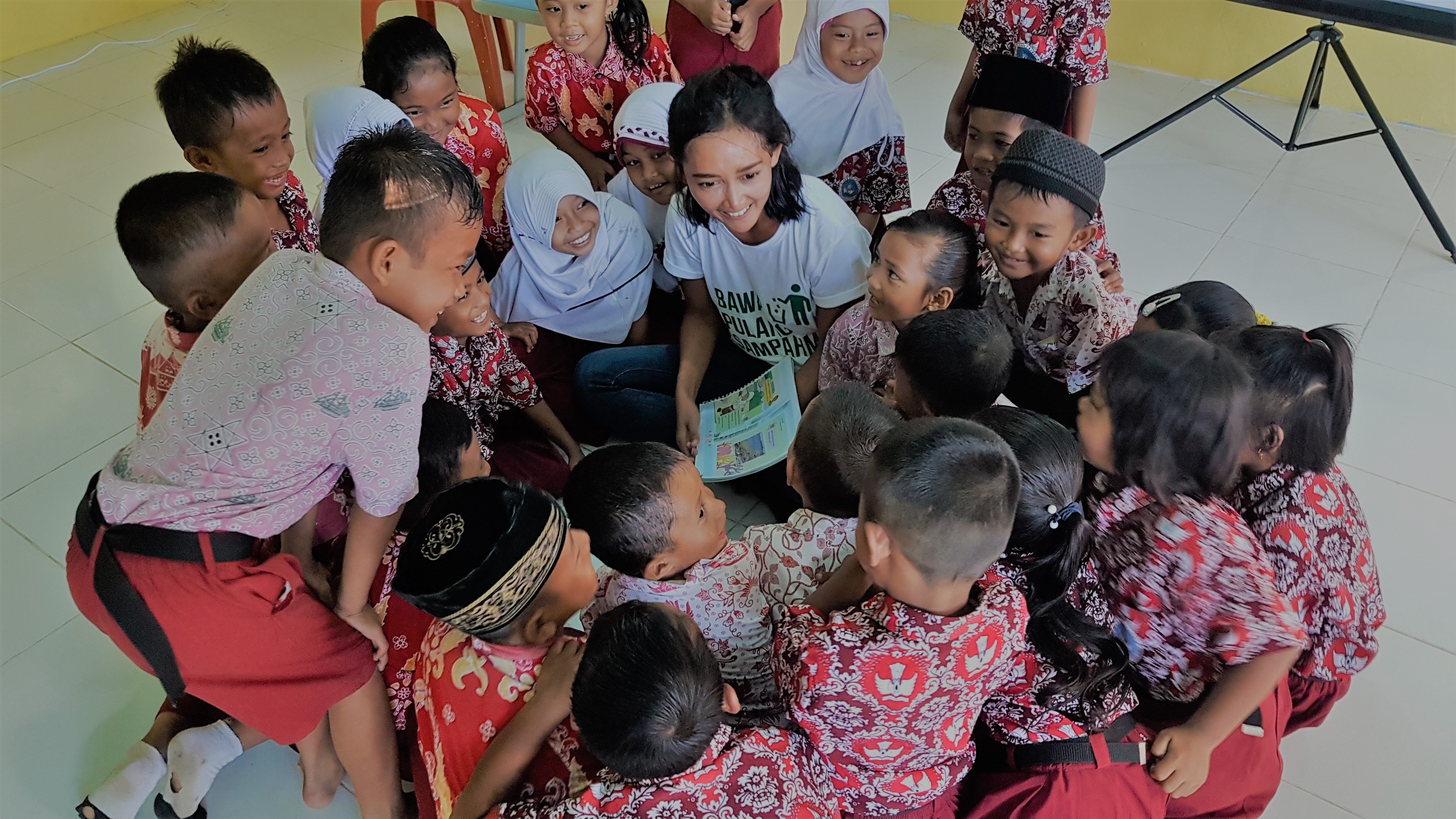
Asri Putri, Deputy head of the Anambas Foundation shares with us "How Circular Economy Reduces Plastic Waste and Elevates Communities in the Anambas"
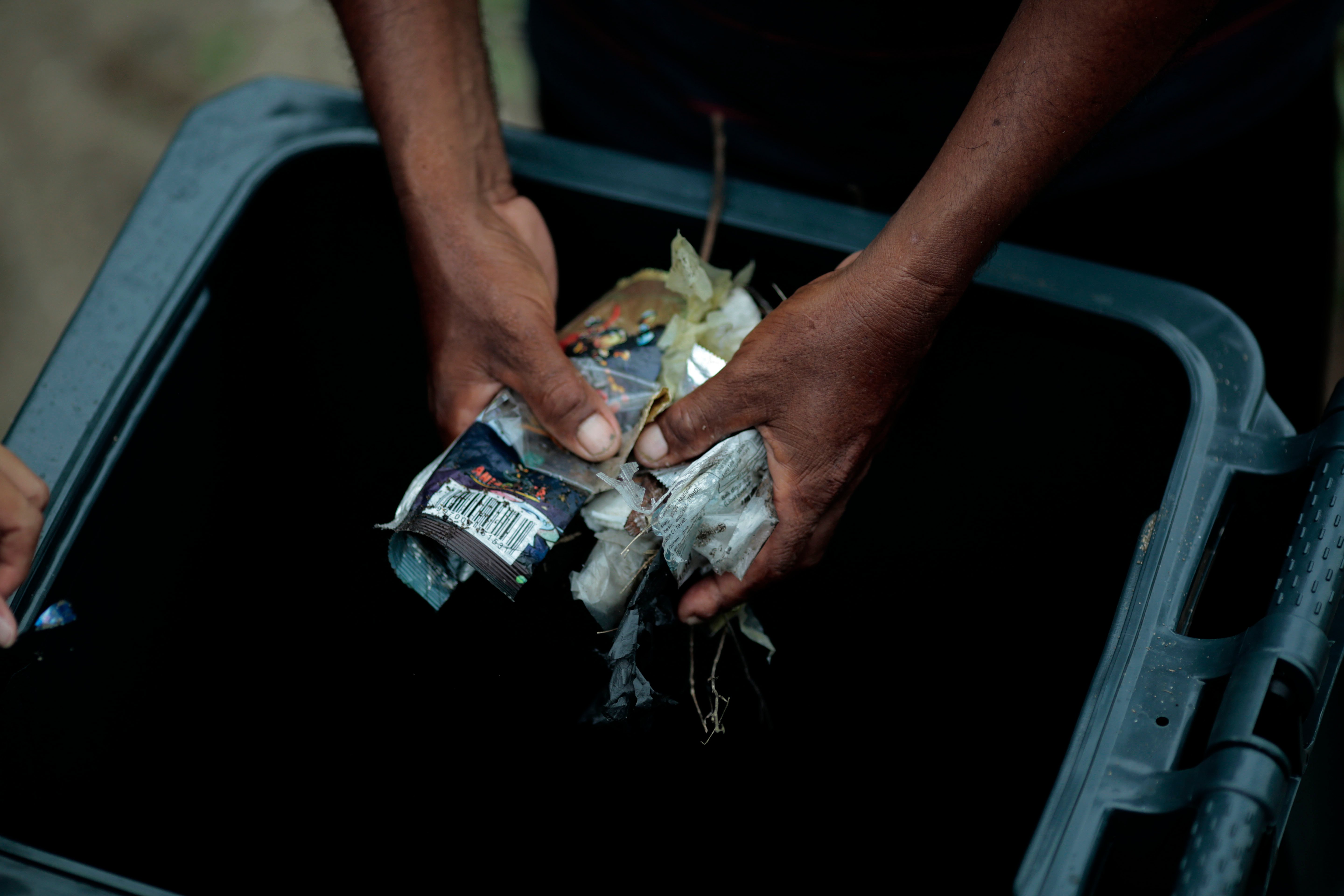
Plastic waste is a huge problem in Indonesia, the country is the second largest plastic waste
contributor in the world right after China. In 2019 waste in Indonesia reached 64 million. Out of 380 final disposal sites (landfills) available across the region, 50% of them have almost
reached their maximum capacity and according to Sustainable Waste Indonesia less than 10
percent of the plastic waste is getting recycled.
Meanwhile, plastic consumption continues to rise, in line with economic and population
growth in the country. Data released in 2019 by Ministry of Industry shows that in the next five
years, plastic consumption will increase from the initial 17-23 kilograms to 25-49 kilograms per
capita per year.
So how do we as individuals and as a society tackle this issue? First, we start by practising
the 3R's - reduce, reuse, recycle. Limiting the use of plastic bags and opting for reusable
shopping bags is something that everyone can do and requires minimum effort.
Another solution that can benefit the society as a whole is practising circular economy.
According to Wikipedia: " A circular economy is an economic system aimed at eliminating waste and the continual use of resources. Circular systems employ reuse, sharing, repair, refurbishment, remanufacturing and recycling to create a close-loop system, minimising the use of resource inputs and the creation of waste, pollution and carbon emissions." WIKIPEDIA
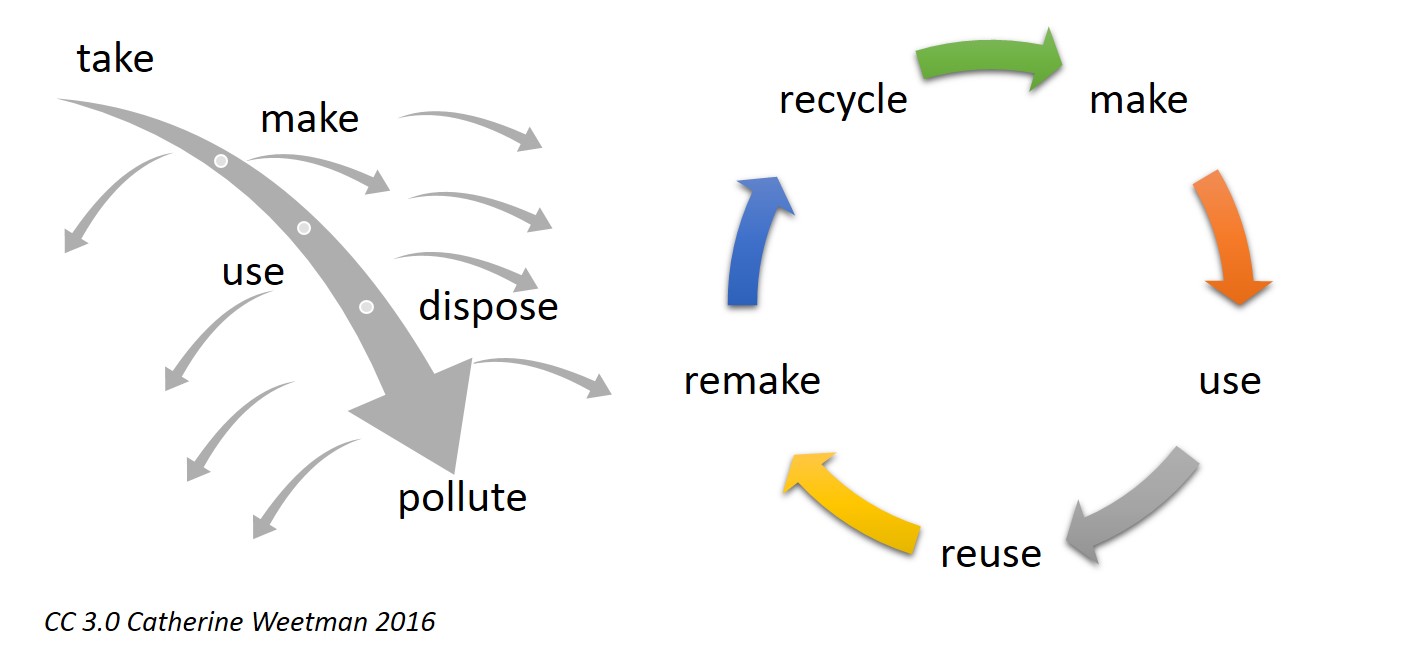
Image: Model Linear versus circular economy, WIKIPEDIA
So a circular economy is the opposite of the traditional linear economy (take-make-use-dispose) in which we utilise resources for as long as possible, extract their maximum value while they are usable and dispose when they reach the end of their life.
Recycling and up-cycling are two ways of converting waste or used products like plastics, bottles, and paper to new items that have economic value. By utilising the economic value contained in waste, we can reduce the amount of rubbish disposed in landfills and reduce environmental pollution. Furthermore, circular economy increases employment and the economy. The Indonesian Plastics Recyclers (IPR) mentioned that the economic turnover generated only from plastic waste is said to reach up to IDR 6.5 billions.
The Anambas Foundation (AF) introduced the circular economy model to the people of the Anambas Islands in 2019. Those who resided in Kiabu village, were taught how to make recycled and up-cycled products as part of the organization's Integrated Waste Management program.
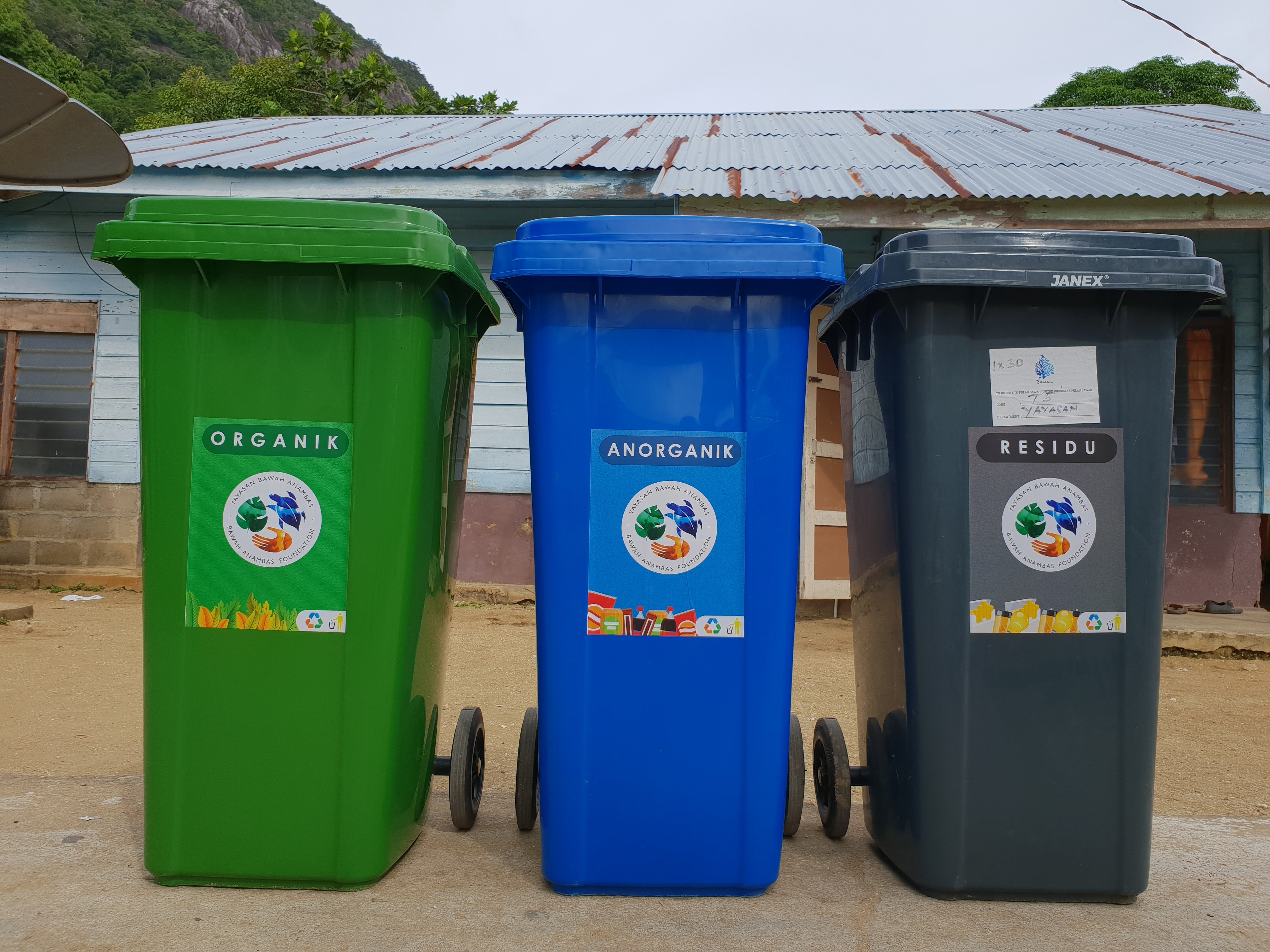
In the first stage AF provided them with education on waste sorting and facilities that supported waste management process in order for them to get materials needed to make recycled and up-cycled products.
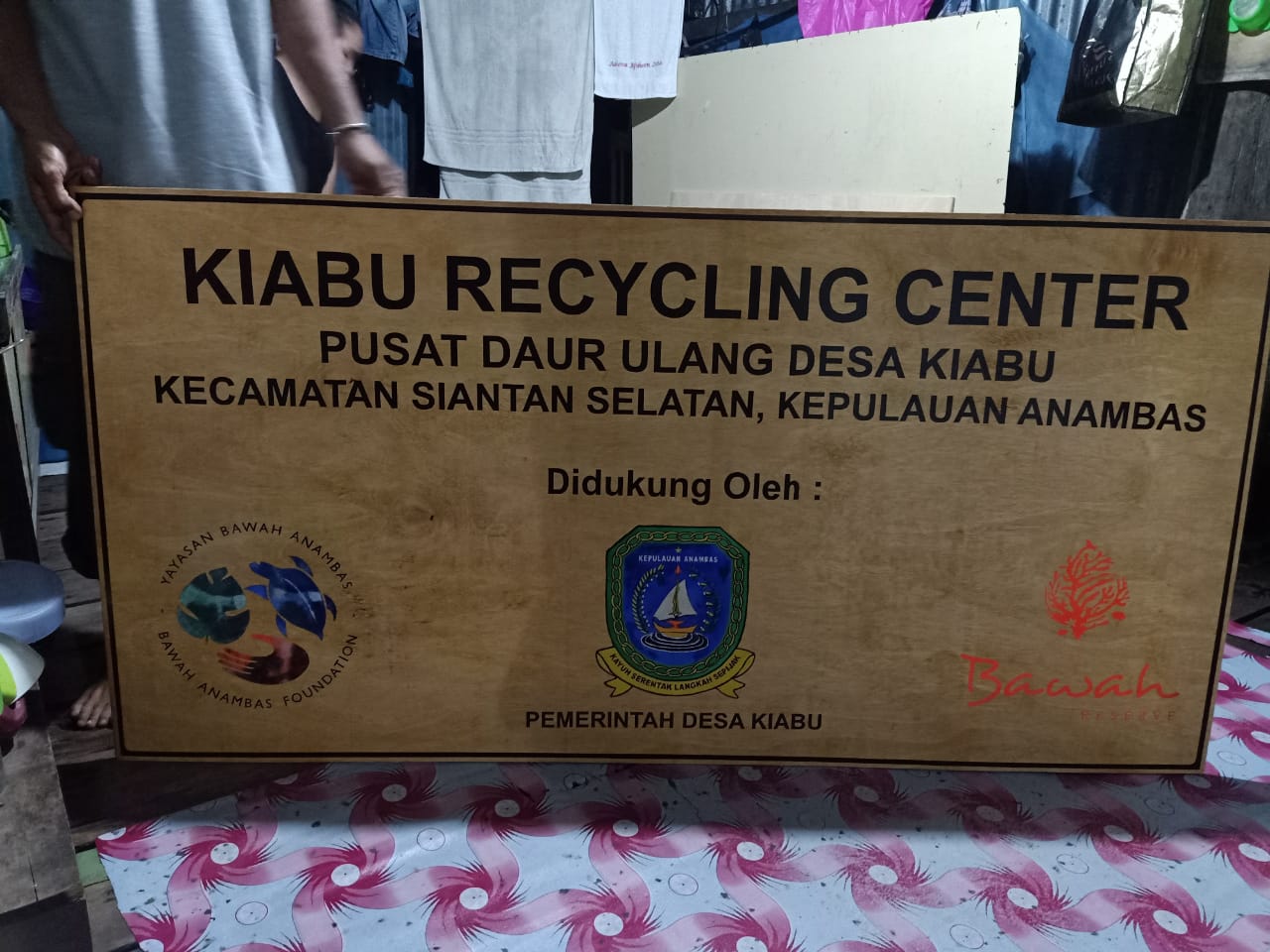
AF then divided the training into two parts: first, an up-cycling training conducted by a
volunteer from America and Bawah Reserve staff to create bags and pouches from plastic
waste; second, recycling training to create bricks made from plastic and styrofoam that can
be used to build structures within the community.
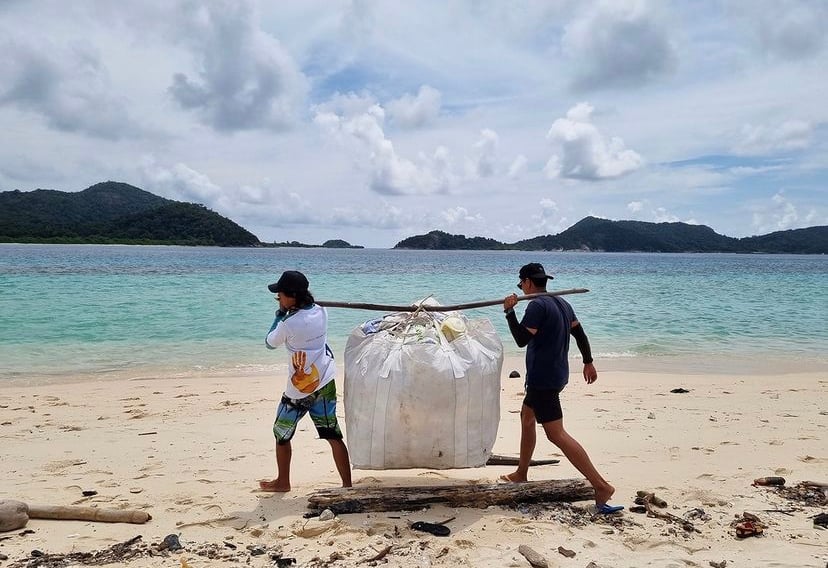
The locals are still learning and improving their craft and AF continues to provide necessary support needed for the circular economy to run properly. Moreover, Bawah Reserve has made a commitment to buy these recycled and up-cycled products once they reach the required standard set by the resort.
The program is expanding beyond Kiabu and will receive help from members of the
women's group in Kiabu who are willing to share their skills with the people of Telaga village.
In the future, AF is planning to conduct an online follow-up training session to improve the quality of the products in order to gain higher economic value. The hope for this initiative is to help elevate the locals skills set and improve the economy in the Anambas all while helping to eliminate plastics from the beautiful natural surroundings of the archipelago.
If you would like to learn more about sustainability at Bawah Reserve please click here
An all-inclusive experience, redefined…At Bawah Reserve in Indonesia’s pristine Anambas...
Begin your day at Bawah Reserve with your choice from our Juice Butler service: fresh...
If you’ve noticed the beautifully patterned fabrics in your villa, you’ve already...
Ready to make a splash?For guests who are both swimming-fit and up for a challenge,...
Welcome to the thermal contrast therapy facility at Aura Sanctuary at Bawah Reserve,...
Planning your dream private island holiday in Indonesia? Here at Bawah Reserve, we...
3 ways to repost or use our Instagram Reels
We love that you want to share a little...
2024 wellness trends were exciting for sure, but it keeps getting better! The top...
A new subtle yet powerful trend - that of being “demure” and “mindful” - has been...
When we think of bees, honeybees often come to mind. However, at Bawah Reserve, a...
In the heart of Southeast Asia lies a hidden gem that promises a retreat into nature,...
It’s safe to say that if you ask someone to name a tropical island destination, they will...
As we step into 2024, the world of well-being is teeming with transformative trends that...
2 years ago for Earth Day 2022, we created 10 sincere pledges for investing in the planet...
Starting to plan your dream wedding? Some couples have a clear idea of their perfect...
We are often asked about the best time of year to schedule a trip to Bawah Reserve.Which...
Our faraway paradise is well worth the journey and there are many ways to get to Bawah,...
© Bawah Reserve 2024. Anambas. Riau Islands. Indonesia
leave a comment